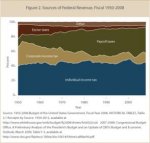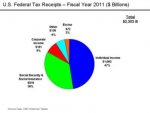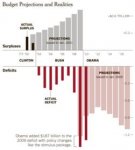Blah blah blah… more nonsense and partisan tripe… blah blah blah… Bush was evil blah blah blah… Obama’s farts smell like roses… blah blah blah…
Re: Your comments on “like”s:
I disagree & don’t intend on discussing “like” points @ length… theyre a gimmick, arbitrarily given based on partisan favoritisms… & I’ve seen plenty ignorant fools who post on here that have thousands of “like”s on their posts… I see plenty bad 1-liners that match the MSNBC vs FOXNews talking points get multiple “like”s, while lengthy detailed rational arguments based on fact with detail provided that get largely ignored because people don’t want to read them.
Re: Your response to my comment that the government survives off funds it takes from the private sector:
Your response that payroll taxes are the majority of taxes does little to disprove that. Where do you think payroll taxes come from? THE PRIVATE SECTOR!!! You say corporations don’t pay taxes… but they pay 10% of the revenue, and the majority of the payroll taxes. The rest of the payroll tax comes out of individual wage earners salaries, which is also broken down by the percentage of their earnings. Thus, in the same way that wealthy people pay 70% of the individual income taxes, they also pay over 2/3rds of the income portion of the payroll taxes as well.
But, I wasn’t making a rich vs poor class warfare argument. I was simply pointing out, that government revenue is generated from taking the people’s money out of the private sector… 40% of taxes come from individual income, 40% comes from payroll taxes, 10% are from corporations… but this is money taken out of the private sector…
Why is the government taking money out of the private sector, to give it back to spur growth in the private sector? That makes no sense… if the government left the money in the private sector, the private sector would be working much better…
If the payroll taxes were eliminated, there’d be more money for companies to hire employees. Also, the cost of labor wouldn’t be as expensive of a burden for a company & they could take on larger workforces… Then there’d be more earners, to cover the balance in individual taxes, but also wouldn’t need to depend on the government for services…
Re: Your discussion of the Auto-Bailout, that it saved cost because of unemployment benefits avoided:
It’s a heavily flawed argument, because both GM and Chrysler made massive layoffs even while on government assistance, then when they recovered they rehired the employees… So we payed massive amounts of unemployment benefits. We also didn’t help any companies other than GM and Chrysler, which was sold to FIAT. Toyota, Ford, VW, Honda, Peugeot , Renault, Daimler AG, BMW, etc. all survived the market stall without Obama… So the auto-industry would’ve been just fine without a bad stock purchase…
RE: A comparison of Solyndra failing to Iraq war payments:
I love false comparatives of something non-defense related, to something spent in the past. How about the cost of AFPAK? Since that’s Obama’s contribution… an expansion to the war… and air strikes into Libya, which were completely unnecessary…
You realize, though, that because those costs for the Iraq War had already been made, and had already increased the debt, it makes the Solyndra (and the 19 other such failures), stand out as that much more egregious, where the government should’ve been more fiscally responsible? When the Iraq war payments were added to the debt the debt was about $5T… When the Solyndra type deals were added to debt it was already well over $10T… and it has now been raised to over 100% of our GDP…
Re: Your link to the “Cost of War” as the sole cost of a war:
It’s an obviously biased organization which fails to list the costs of inaction in response to the terrorist activities that the nations of international terrorist organizations, and the states that sponsored them. In the 90s we had an ever increasing amount of attacks of a grand scale, which caused massive devastation and disrupted the economy (WTC bombing in 93, OKC bombing in 95, the Khobar Tower bombing and partially thwarted Bojinka Plot in 96, the Sarin gas attack on the Japanese transit system in 97, the Simultaneous bombings of the US Embassies in Kenya and Tanzania in 98, the USS Cole bombing in 2000, then the 9/11 attacks on the WTC, Pentagon, and who knows what else).
If you add up the cost of the impact of those events on our society, it far exceeds the cost of both the Afghanistan and Iraq wars. The cost of inaction might have been greater, considering the increased lethality to the attacks, bearing witness to the bombings on the London Underground and on the train in Madrid, as well as the thwarted shoe and underwear bombings and the thwarted millennium bombings, etc.
Those wars were necessary and prevented a wider scale devastation, the likes of which we may not realistically be able to fathom, with costs far more unacceptable than what the government spent on changing the pattern of destruction.
Re: The government wasting money on creating a nuclear power industry:
Im not fond of the nuclear power industry… It’s an unsafe science, with no realistic way to deal with the waste product. I grew up in a town with a nuclear plant, and not coincidentally there was a high rate of cancer incidents in that town… There are far safer ways to create energy such as windpower, solar power, and hydroelectric, if done responsibly…
There was no need for the government to get involved with that industry either… If the market is there, the industry will grow… if the market is not the industry will not…
Re: You advancing the opinion that the stimulus was effective, and that it failed because it wasn’t big enough:
You mean most Democrats that want Obama elected will tell you that the stimulus was effective… most independent sources say ARRA was highly ineffective… and has not created the recovery it was intended to… and instead contributed to the debt, which has stood out as a major problem moving forward, which holds down the economy…
Re: your bogus claim that Obama didn’t increase spending:
Again you fail to grasp the argument… It’s not that Obama created the financial crisis of 2007-2009… it’s that Obama’s handling of the economy had created the stagnation and current decline, and left us with massive debt burdens which will hamper the economy for decades to come…
You say other than stimulus… but the stimulus was excessive in MANY people’s minds (including $800B of ARRA, and $400B of TARP which rightly could’ve been returned), and led to little worth, there was the AFPAK expansion, the ACA, and numerous other spending bills which have drastically increased spending… don’t be a fool…
That very graphic you posted (which is outdated) even shows that Obama’s massive increase in spending further balloons up in 2010, 2011, and 2012… after he announced in 2009 that the recession was over…
You want to talk about the previous administration… the previous administration came in during a recession, and then had a massive attack on the WTC, which required a heavy amount of spending on military and security apparatus… Obama came in, and had the tail end of a recession… but kept spending regardless of it being over…




